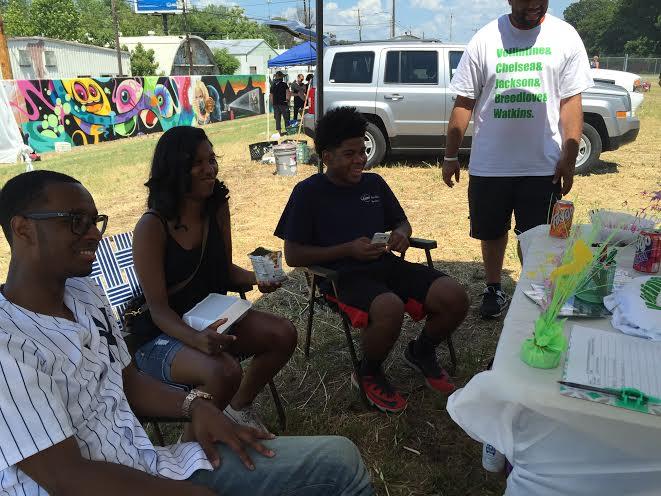Want to start your own project but need some inspiration? Our Learn from a Leader blog series is profiling past ioby Leaders who succeeded in bringing more fresh food, active transport, green spaces, and other healthy improvements to their neighborhoods. Read on, and imagine what you could do on your block!
About the project:
Native Memphian Michalyn Easter made a splash earlier this year with her project Friends of Chelsea Greenline Advocacy Group, which raised close to $2,000 to to give North Memphians an official voice in the development of their neighborhood’s new 2.5-mile greenway.
Now, with the nonprofit she founded, Our Grass Our Roots (OGOR), Michalyn is leading a different kind of project to improve health, safety, and quality of life in her neighborhood: a 311 phone bank group. The group meets monthly to make service requests to the city, and submits them all using one account (”OGOR Memphis”) so they can easily track their success rate—which is currently an impressive 98%. (That last 2%? It was a highway entrance issue that technically fell in the state’s—not the city’s—bailiwick. So by some accounting, they’re at 100%!)
“I think the group has made some people more aware of what we can do about our surroundings,” Michalyn says. “They’re not just standing there anymore, shaking their heads and saying, ‘Oh, the neighborhood’s gone down.’ Together, we’re showing the city that they can’t just take care of the wealthiest areas. In North Memphis, we pay taxes, too, and we care about our quality of life as well.”

The steps:
- Get (and give) the facts. Many cities have a 311 hotline and website residents can use to request city assistance with issues like trash pile-ups, downed power lines, overgrown weeds, etc. I knew Memphis had a 311 system, but learned more about it when I took a local leader training. When I got the idea to start a monthly phone bank, I created a quick presentation about its purpose and process to share with my neighbors. (Mine is in PowerPoint, but you could make a paper handout, a PDF file, etc.) I make it available to new participants at every meeting.
- Secure a space. Locate a place in your neighborhood with computer and internet access (or wifi, if you can bring your own laptop) that will allow you to convene a community group free of charge, and make a monthly reservation there. Libraries, community centers, and churches are a few good go-to options. 311 requests can be made by phone as well as online, but we’ve found it’s more fun and social to submit them via the web, since people can follow along visually with the process.
- Get your heads together. Find a couple of people other than yourself who are willing to be group leaders and moderators. Make sure they’re reliable, well-versed in the ways of 311, and can help other attendees with the process of submitting their requests. So far, at each meeting, we’ve had between five and ten people attend, and made 10 or 12 requests.
- Spread the word. Make flyers and post them on the bulletin boards of neighborhood watch groups, religious organizations, your host space, etc, to start bringing people out. Ditto on the internet: send Facebook messages, emails, Tweets, etc, to organizations and people you think might be interested in participating, and ask them to spread the word, too.
- Enjoy! A lot of us like this project because, A) It’s effective, B) It’s low-stress, and C) It’s a nice time for fun and fellowship. Bring a box of donuts, catch up with your neighbors about what’s going on where you live, and repeat next month!
Time/timing:
- Phone banks can—and should!—take place year-round. Some requests are seasonal (mosquito trucks in the summer and snow plowing in the winter), and some could happen at any time (missing street sign, pothole).
- It took me about three weeks from getting the idea to holding our first meeting—somebody else could probably do it in less! This can be a very quick, “light” project to put together.
- We noticed that some other neighborhood groups schedule their meetings on weekday mornings, when often only retired people can attend. We do ours from 3:30 – 5:30 pm, which allows more folks to join.
Budget:
Another great thing about phone banking: it is extremely low-cost!
- 311 is free to use (as it should be!)
- OGOR puts $20 toward snacks and juice or water for the group once a month. Sometimes participants will also bring something to share.
- Since OGOR is a nonprofit, we have access to free printing. But often libraries will let guests print a few pages for free, and even retail printing of your handouts/flyers probably won’t add up to more than $10 per month.
Additional resources:
– OGOR 311 Phone Bank on Facebook
– Michalyn’s PowerPoint presentation
About the author:
Michalyn Easter is a proud Memphis native, and the founder of the nonprofit Our Grass Our Roots, which focuses on progression through informative initiatives in the North Memphis area.

Feeling inspired? Want to take action in YOUR neighborhood? If you have awesome ideas about how to make your town greener, safer, and more fun, let us help! Tell us your awesome idea right here. We’d love to help you get started today.